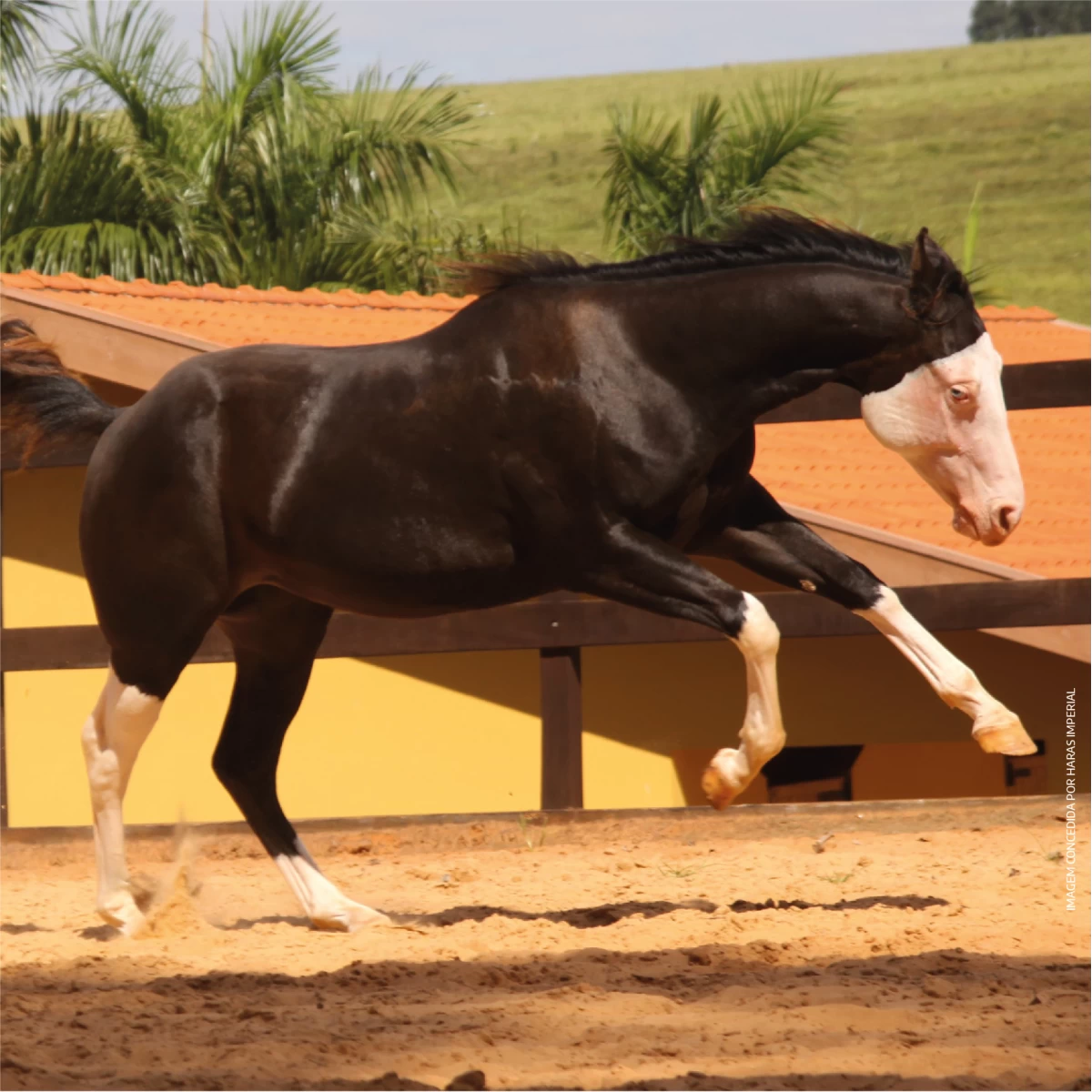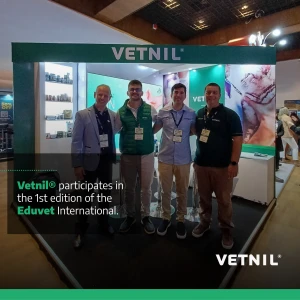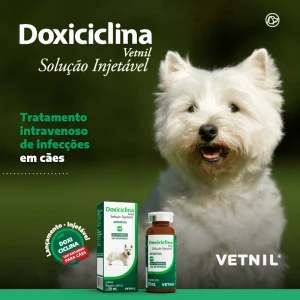VETNIL SITE USE AND PRIVACY POLICY
- INTRODUCTION
VETNIL INDÚSTRIA E COMÉRCIO DE PRODUTOS VETERINÁRIOS LTDA, CNPJ 73.196.438/0001-60, is committed to protecting your privacy.
Our Privacy Policy was designed to communicate our practices regarding the collection, use and disclosure of Personal Data that the USER may provide through the use of the Vetnil website http://www.vetnil.com.br and other associated websites, microsites, apps and sub-sites.
In order for our services to be offered in the best possible way, our team, website and platform collects various Personal Data, aiming to offer the best experience and efficiency for you. We at VETNIL are aware of the importance of your privacy and take all possible measures to ensure it.
The conditions and information presented in this term are in accordance with Brazilian law, also complying with the terms of Law No. 13.709/2018 (“GDPL - General Data Protection Law”) and related rules.
Acceptance of the terms of this policy will be made through access to our sites, after your registration at the first access to our site or for exceptional cases, via email. By accepting this, you declare your knowledge and full agreement of how your Personal Data will be used.
1.1. DATA CONTROLLER
When this policy mentions "VETNIL", as well as grammatical variations of the first person plural, it refers to Vetnil Indústria e Comércio de Produtos Veterinários Ltda which is responsible for your Personal Data under this Privacy Policy (the "Data Controller").
1.2. PERSONAL DATA
"Personal Data" means any information provided by the USER, or collected by the VETNIL website, that can identify the USER as an individual.
- COLLECTION OF PERSONAL DATA AND ACTIVITIES
2.1. The USER's Personal Data and information will always be submitted voluntarily by it and may be collected in the following ways:
2.1.1. DIGITAL PLATFORM AND WEBSITE
The USER's Personal Data is provided by it and collected through the platform provided by VETNIL through the Vetnil website: http://www.vetnil.com.br.
2.2. The Personal Data we collect may vary depending on the use that the USER makes on the website, namely:
|
PERSONAL DATA
|
PURPOSE
|
LEGAL BASIS
|
|
Full name, telephone number, CPF, ID, email, date of birth, marital status, country and municipality of residence, address of current residence and/or other fields requested by the form on the VETNIL website.
|
Registration of the USER profile on the VETNIL website so that it can have access to the services offered by the website, such as sending CONTACT INFORMATION through the CONTACT FORM OF THE WEBSITE AND THE WORK WITH US CONTACT FORM.
|
The USER's Consent will occur at the time of registration and sending data when it must read the CONFIDENTIALITY TERMS in full and click on the checkbox “READ AND ACCEPT”, thus the registration will be carried out in the database next to the registration that includes the CPF of USER.
|
|
IP address, USER registration date and time, USER exit date and time, device, model, operating system, country, region of the updated location at the time of access, actions on the platform or website.
|
For the purpose of complying with the obligations set out in the Brazilian Civil Right Framework for the Internet (Law No. 12.965/14) and for offering products and services to the USER in a more assertive manner, based on its preferences.
|
The USER's Consent will occur at the time of registration and sending data when it must read the CONFIDENTIALITY TERMS in full and click on the checkbox “READ AND ACCEPT”, thus the registration will be carried out in the database next to the registration that includes the CPF of user.
|
|
The activities and actions performed by the USER and registered on the platform, such as (I) screens accessed, (II) date and time of the actions performed, (III) operations performed within the platform or website and (IV) data on the behavior of the USER within platform or website.
|
To offer the USER a customized experience of using the website, with indication of products and services compatible with the USER's profile.
|
The USER's Consent will occur at the time of registration and sending data when it must read the CONFIDENTIALITY TERMS in full and click on the checkbox “READ AND ACCEPT”, thus the registration will be carried out in the database next to the registration that includes the CPF of USER.
|
2.2.1. REGISTRATION DATA
Full name, telephone number, CPF, ID, email, date of birth, marital status, country and municipality of residence, address of current residence and/or other fields requested by the form on the VETNIL website.
2.2.2. NAVIGATION DATA
IP address, USER registration date and time, USER exit date and time, device, model, operating system, country, region of the updated location at the time of access, actions on the platform or website.
2.2.3. DATA FROM THIRD PARTY LIBRARIES
Data used to improve the USER's experience on the platform or website.
2.3. The activities and actions performed by the USER and registered on the platform or website include, but are not limited to (I) screens accessed, (II) date and time of the actions performed, (III) operations performed within the platform or website and (IV) data on the behavior of the USER within the platform or website.
2.4 The Platform can also make use of technologies such as (I) cookies, and the USER must configure its Internet browser if it wishes to disable them, see the topic.
- COOKIES
3.1. WHAT ARE COOKIES?
Cookies are files created by the websites you visit. They make your online experience easier by saving browsing information. With cookies, websites can keep you connected, remember your website preferences and deliver relevant content locally.
There are two types of cookies:
PRIMARY COOKIES: created by the website you access. The website is displayed in the address bar.
THIRD PARTY COOKIES: created by other websites. These sites have a piece of content, such as advertisements or images that you see on the webpage you access.
3.2. HOW WE USE COOKIES
Cookies are used on the website to collect information for our technical, administrative team and mainly to improve your experience when browsing the website. They are categorized as follows:
3.2.1. AUTHENTICATION COOKIES: serve to recognize a specific USER, enabling access and use of the Website and/or Application with restricted content and/or services and providing more personalized browsing experiences.
3.2.2. SECURITY COOKIES: are used to activate security features of the Websites and/or Applications, with the purpose of assisting in the monitoring and/or detection of malicious activities or activities prohibited by this Privacy Policy, as well as to protect the USER's information from access by unauthorized third parties.
3.2.3. RESEARCH, ANALYSIS AND PERFORMANCE COOKIES: the purpose of this type of cookie is to help understand the performance of the Website and/or Application, measure the audience of the Website and/or Application, check the browsing habits of the USERS on the Website and/or Application.
3.2.4. SEGMENTATION COOKIES: are linked to services provided by third parties, such as, for example, “Like” buttons and “Share” buttons contained on websites other than the VETNIL website. The third party provides these services because it recognizes that you have visited our website, but in no way is it to be confused with VETNIL itself.
Regarding the aforementioned cookies, you can control whether they will be used or not (see the topic "How to Disable Cookies" below), but blocking them may prevent us from offering some services or impair good navigation on our website.
3.3. HOW TO DISABLE COOKIES
Usually the settings to disable cookies are present in the "Options" or the "Preferences" menu of your browser. To learn more, see your browser's help options. Below you will find some names for the most popular browsers: Internet Explorer, Firefox, Chrome, Safari Web and iOS or other similar platforms.
The cookies practiced by the VETNIL website are safe and necessary for the good use of the tools and options offered by the website. If you choose not to accept and/or execute them eventually, the behavior of some features of the platform may have its functions compromised during your visit.
- HOW WE USE THE INFORMATION WE COLLECT
We may use, store and process personal information to (I) provide, understand, improve and develop the VETNIL Data Platform, (II) create and maintain a reliable and secure environment (how to comply with our legal obligations and ensure compliance with the Privacy Policy) Privacy) and (III) provide, personalize, evaluate and improve our advertising and marketing.
4.1. SUPPLY, IMPROVE AND DEVELOP THE VETNIL PLATFORM
We may use personal information to provide, improve and develop the Platform, such as:
- allow you to access and use the Platform;
- operate, protect, improve and optimize the experience and the Platform, such as when performing statistical analysis and conducting research;
- if you provide us with your contact information, we may process that information to: (I) facilitate your referral invitations, (II) send your requests for referrals, (III) fraud detection and prevention, and (IV) any purpose that you authorize at the time of collecting Personal Data;
- to operate, protect, improve, optimize the experience and the Platform, personalize and model your experience.
We process this information for these purposes because of our legitimate interest in using it to improve the VETNIL Platform and the experience of our USERS; in addition, we process them where necessary for the proper execution of the environment.
4.2. CREATE AND MAINTAIN A SAFE AND RELIABLE ENVIRONMENT
We may use personal information to create and maintain a reliable and secure environment, such as:
- detect and prevent fraud, spam, abuse, security incidents and other harmful activities;
- conduct security investigations and risk assessments;
- verify or authenticate the information or identifications provided by you;
- comply with our legal obligations;
In connection with the above activities, we may make profiles based on your interactions with the VETNIL platform, your profile information and other content that you send to the platform and information obtained from third parties. If you contest the decision based on the automated process, please contact us, as provided in the Contact Us section on our website http://www.vetnil.com.br.
We process this personal information for these purposes because of our legitimate interest in protecting the VETNIL Data Platform, to assess compliance with applicable laws.
4.3. PROVIDE, CUSTOMIZE, MEASURE AND IMPROVE OUR ADVERTISING AND MARKETING
We may use personal information to provide, personalize, evaluate and improve our advertising and marketing, such as:
- send you promotional messages, marketing messages, advertising reports and other information that may be of interest to you and advertisements on social media platforms (such as Facebook or Google);
- customize, measure and improve our advertising;
- administer promotional activities or events sponsored or managed by VETNIL;
- invite you to relevant events and opportunities.
We will process your personal information for the purposes listed in this section, considering our legitimate interest in conducting marketing activities that may be of interest to you.
- SHARING AND DISSEMINATION
VETNIL does not disclose to third parties any Personal Data provided by the USER through the website and/or platform, except:
- In cases where VETNIL is obliged to disclose or share the USER's Personal Data, in order to comply with any legal obligation (for example, by virtue of a court order, or for the purposes of preventing fraud or other crimes as well as in response to the request for information submitted by the competent authority, if we believe that the disclosure complies with or is required in accordance with applicable laws, regulations or procedural procedures;
- To protect the rights, assets and/or security of the platform, the USERS of the website, or any third party. This includes exchanging information with other companies and organizations for the purposes of fraud protection;
- VETNIL may share information with the general public, if you send content to an open forum, such as blog comments, social media publications or other resources available through our services and visible to the general public;
- We may share information with third parties whom you choose to let us share information with (as described in section 7 - Your Rights), for example, in the case of other applications or websites that integrate our platform;
- We can share information with partners who need to access the information to perform the work on our behalf and as described in item 1.1, we are the controllers of Personal Data;
- If, by notification, you agree to share them (as described in section 7 - Your Rights);
- In an aggregated and/or anonymous way that cannot be used to identify you. For analysis, used in third party libraries. The terms of use and privacy policy for these libraries can be found at the link below:
Google Play Services policies:
https://play.google.com/intl/pt-BR_br/about/play-terms
- USER'S RIGHTS
You can exercise any of the rights described in this section with your VETNIL Data Controller by sending an email to vetnil@vetnil.com.br. Keep in mind that we may require you to confirm your identity before taking any action on your order.
Once the legitimacy of the request is verified, we will endeavor to respond to it within thirty (30) calendar days, counted from the validation of the request. In some cases, depending on the complexity or volume of requests, we may extend the mentioned period to up to sixty (60) consecutive days. In any case, we will keep you informed of the progress of your request.
6.1. MANAGING YOUR PERSONAL DATA
You can access and update some of your Personal Data through the settings of your USER access on the VETNIL website and/or platform. You are responsible for the accuracy of your Personal Data and for keeping it up to date.
6.2. RECTIFICATION OF INCORRECT OR INCOMPLETE PERSONAL DATA
You have the right to ask us to correct incorrect or incomplete Personal Data relating to you, which you cannot change through your USER access on the VETNIL website and/or platform.
6.3. DATA PORTABILITY AND ACCESS
In accordance with applicable law, you can request copies of your Personal Data maintained by VETNIL and/or request that we send this information to another service provider (when technically feasible).
6.4. DATA RETENTION AND EXCLUSION
In general, we keep your Personal Data for as long as necessary. If you no longer want us to use your Personal Data, you can request that we delete your Personal Data and close your USER access. Please note that if you request the deletion of your Personal Data:
- We may retain some of your Personal Data as necessary for our legitimate business interests, such as detecting and preventing fraud and improving security;
- We may retain and use your Personal Data to the extent necessary to fulfill our legal obligations. For example, legal reports and audits;
- Even after your USER access is removed, some copies of your Personal Data (for example, log records) may remain in our database, but are disassociated from your USER;
We perform periodic backups on the VETNIL website and data platform, to protect the Data against accidental or malicious loss and destruction. Therefore, residual copies of your personal information may not be removed from our systems. If the deletion is not possible, we will make your Data anonymous.
6.5. WITHDRAWAL OF CONSENT AND PROCESSING RESTRICTION
If we are processing your Personal Data based on your consent, you can withdraw your consent at any time by changing your USER's settings or by sending an email to vetnil@vetnil.com.br specifying which consent you are withdrawing. Please keep in mind that withdrawing your consent does not affect the legality of any processing activities based on such consent prior to your withdrawal.
6.6. OBJECTION TO PROCESSING
In accordance with applicable law, you may require VETNIL not to process your Personal Data for certain specific purposes. If you object to such processing, VETNIL will no longer process your Personal Data, unless we can demonstrate convincing legitimate reasons for such processing or if such processing is necessary for the establishment, exercise or defense of legal claims. When your Personal Data is processed for direct marketing purposes, you can request at any time that VETNIL stop processing your Personal Data for these purposes by sending an email to vetnil@vetnil.com.br.
6.7. SUBMISSION OF COMPLAINTS
You have the right to submit complaints about our activities by filing a complaint with our Data Protection Department, which can be accessed through the “Contact Us” section on our website http://www.vetnil.com.br.
- RESPONSIBILITIES
7.1. The USER is solely responsible for:
7.1.1. any and all acts or omissions performed by it from its access to the Internet, to the VETNIL Website and/or Platform;
7.1.2. any and all content uploaded by it, sent and/or transmitted to the Website and/or Platform;
7.1.3. the repair of any and all damages, direct or indirect (including arising from violation of any rights of other USERS, of third parties, including intellectual property, confidentiality and personality rights), that are caused to VETNIL, to any other USER, or, still, to any third party, including due to non-compliance with the provisions of this Privacy Policy or any act practiced from their access to the Internet, the Website and/or Platform.
7.2. In no event will VETNIL be responsible for:
7.2.1. any act or omission performed and/or damage caused by the USER resulting from access to the Website and/or Platform;
7.2.2. the misuse of the Website and/or Platform by any USER or third parties and/or by the content uploaded, sent and/or transmitted to the Website and/or Platform by the USERS;
7.2.2. failures, technical impossibilities or unavailability of the system;
7.2.3. by installing on the USER's or third party's equipment, viruses, trojans, malware, worm, bot, backdoor, spyware, rootkit, or any other devices that may be created, as a result of browsing the Internet by the USER.
7.3. USERS declare to be aware that any and all content sent and/or transmitted to the Website and/or Platform by any USER and/or third parties does not represent, in any way, the opinion or vision of VETNIL.
7.4. If the USER fails to comply with any provision of this Privacy Policy or legal provision, always in the judgment of other measures, VETNIL may, by itself or by third parties, at any time, at its sole discretion, without the need for any notice or notification prior or after any USER or any third party, in any way or form, without prejudice to initiating the applicable legal measures, suspending or limiting access to the Website and/or Platform, terminating the access of any USER and/or taking other measures that it deems necessary to compliance with this Privacy Policy and for the smooth functioning of the Website and/or platform, at any time.
- OTHER IMPORTANT INFORMATION
8.1. INTELLECTUAL PROPERTY
Belongs to VETNIL: (I) all and any software, application or functionality employed by VETNIL referring to the USERS' Website and/or Access Platform; (II) the visual identity of the Website and/or Platform (including the graphic-visual art project of any of its pages); (III) the business name, brand, domain name, slogan or expression of advertising or any distinctive sign of its ownership inserted on the Website; and (IV) any and all content created and produced by VETNIL, by itself or by third parties, which may not be used, in any way or form, by the USERS.
In the event that the Websites and/or Platform allow the sending and/or transmission of Content by the USER, the USER grants free, non-exclusive, irrevocable and irreversible authorization to VETNIL to use any and all intellectual property rights (including copyright and related rights) about any Content, sent and/or transmitted by the USER to the Website and/or Platform, in any way or form, at its sole discretion, without any restriction or limitation of any nature. The USER declares and warrants that the Contents do not infringe the rights of third parties and that it has obtained all authorizations that may be necessary to enable the use of these by VETNIL.
8.2. SAFETY
We are continuously implementing and updating administrative, technical and physical security measures to help protect your Personal Data from unauthorized access, loss, destruction or alteration. Among the protections we use to defend your Personal Data, we have firewalls, data encryption and information access controls. If you know or have reason to believe that VETNIL's credentials have been lost, stolen, diverted or compromised, or in the event of actual or suspected unauthorized use of your Personal Data, please contact us in the “Contact Us” section on our website or send an email to vetnil@vetnil.com.br.
8.3. INTERNATIONAL STORAGE AND TRANSFER OF PERSONAL DATA
Personal Data maintained by VETNIL may be transferred and stored in countries other than Brazil, including countries in the European Economic Area (“EEA”). It may be that these countries do not have the same data protection laws in force in Brazil. When we transfer your Personal Data to other countries, we protect that Data in the manner described in this Privacy Policy or in the form that is provided when you provide this Data (for example, by means of a specific privacy notice).
8.4. TOLERANCE
Tolerance of any failure by any USER to comply with any of the provisions of this Privacy Policy will not constitute a waiver of the right to demand compliance with the obligation, nor forgiveness, nor alteration of what is set forth herein.
8.5. CHANGES TO THE PRIVACY POLICY
VETNIL reserves the right to modify this Privacy Policy at any time in accordance with this provision. Accordingly, we recommend visiting the Privacy Policy periodically so that you are aware of the changes. If we make changes to this Privacy Policy, we will post it at https://www.vetnil.com.br/politica-de-privacidade, and update the “Last Updated” date at the beginning of this Privacy Policy.
8.6. LEGISLATION AND JURISDICTION
This Privacy Policy is governed in accordance with Brazilian law. Any disputes or controversies arising from any acts practiced in the context of the use of the Websites and/or Applications by the USERS, including in relation to the breach of this Privacy Policy or for the violation of the rights of VETNIL, other USERS and/or third parties, including rights of intellectual property, confidentiality and personality, will be processed in the District of Louveira in the State of São Paulo.
- CONTACT US
If you have any questions or complaints about this Privacy Policy or about VETNIL's information handling practices, these can be clarified through the email vetnil@vetnil.com.br.
VETNIL is located at Av. José Nicolau Stabile, 53, Burck, Louveira/SP, ZIP CODE: 13290-000.




